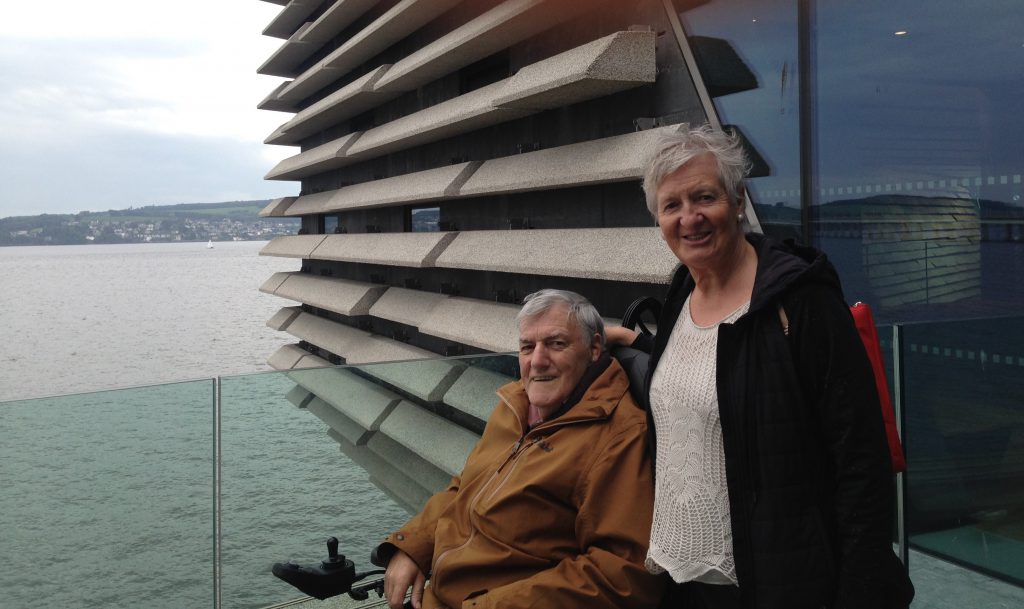What is MND
Find support
I have MND
I am supporting someone
Get involved
Research
About MND Scotland

Originally from Kintyre (West Coast), the grandfather of four, is a retired Avionics Engineer with a passion for golf and sailing. Seven years after retiring Angus’ life was turned upside down when he received his MND diagnosis in July 2018.
He said, “I first started falling over a couple of years ago, so I went to the doctors, but it took around 18 months for my actual diagnosis. I think I went through every test known in medical science! It was a process of elimination – they went through everything to rule things out and then eventually it came up that it was MND.
“I was surprised. I had heard of MND but had no real idea what it was all about. It took a wee while to sink in exactly what it meant. I’m well into it now having researched it.
“My MND is progressing quite slowly but I’m getting weaker. I can feel my muscles fading and you can see it too. I can’t walk now so I’m in a wheelchair.”
Married to Carole, a retired teacher, the couple have two children: Katherine, who lives in London and Iain, who lives close by in Auchnagatt. They also have four grandchildren; Ellie (15), Merryn (13), Maya (13), and Isla (10).
“The kids are coping fine with it and they come to visit quite often. We used to go to London a lot to visit the family, but that is a bit more of an undertaking now, so my daughter comes up here. We’re aiming to go to Dundee at the weekend to try and get away somewhere. The wheelchair accessible vehicles aren’t really great for long distances, because I’m sitting in my chair without moving for a longish time and that is not so comfortable. We’ll give the train a go and see what it’s like. We’ll go to the new V&A and meet up with Carole’s cousins and it’ll be nice to see how we get on with the train.”
Speaking about the support he has received, Angus said, “Carole and I use MND Scotland’s complementary therapy service and the massages are really good, and I have been given help with all the welfare and benefits forms. The council have been great too – we got help with a wet room and they are sorting a ramp to help me get in and out of the house more easily. Both make a huge difference. ”
For MND Action Week 2019, charity MND Scotland is calling on you to imagine what it would be like to have MND and to take action to end MND forever.
“I don’t think people really know how it affects you on a day to day basis. But then I guess they don’t really need to know, unless it affects them.
“My life is chalk and cheese compared to before the diagnosis. I used to play golf, which of course I can’t now because I can’t sit in a wheelchair and swing a golf club. I used to love sailing too, which I can’t do anymore either.
“It was very hard accepting these things but I’m starting to get used to it. I can’t drive either and I think that was the hardest one. I feel a bit in limbo at the moment as I don’t know what to do with myself but I’m sure I’ll find something to do to replace these things.
“There doesn’t seem to be an awareness out there for just how debilitating it can be. Someone can look perfectly normal with it and seem fine, but they’re not. The number of people who tell me how great I’m looking, and I just wish I felt it. That’s one of the biggest things, people don’t realise the affect it can have on you. Obviously my wheelchair is an outward sign, but that could be anything from a broken leg to a sprained ankle.
“There does seem to be more awareness of it now than there used to be, or maybe it’s just because I’m more aware. I certainly didn’t know much about it before I got it.
“There’s no two ways about it, you just have to get on with it. It’s a pity you can’t pick and choose what happens in life. We’re usually positive – or we’re trying to get it that way again.”
For MND Action Week we’re calling on the nation to join us and help us to not just imagine a world without MND, but to make it a reality. To donate £3 to MND Scotland text IMAGINE to 70660 or visit www.mndscotland.org.uk/imagine.
Sign up
for newsletter
Get the latest news and events straight to your inbox.
You can help create a world without MND